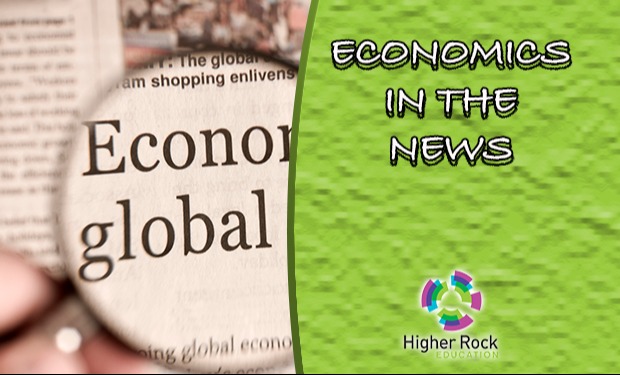
Economics in the News – April 21-27, 2025
Economics impacts our lives every day. Below are some of the top storylines from this past week related to economics.
o Snacking is the latest thing that consumers are pulling back on. Leaders of consumer staples brands such as Pepsi have stated that apprehension in the global economy is key to less consumer spending. The pullback has started to weigh on company bottom lines and have dampened their short-term outlooks.
Leaders from fast-casual chain Chipotle have also seen fewer diners at their restaurants, while imports and tariffs on aluminum have raised the company’s costs for food, beverage and packaging. In addition, Proctor & Gamble, which sells laundry detergent and other household staples has noticed that consumers have scaled back on detergent purchases and other products. [The New York Times]
o Americans are tired of tipping. Many Americans are tipping less, with many frustrated with tip requests for basic transactions and service charges. Many are pushing back against tipping prompts with cash-only tips or raising their standards for tip-worthy service, frustrated by the constant prompting by coffee shops and concession-stand kiosks. Meanwhile, others are simply eating out less or buying less.
While consumers have returned to full-service restaurants while dining, many diners are less patient with bad service or being asked to order via QR codes. Other diners are deducting service charges added by restaurants from their tips to servers, as some restaurants have added charges to quickly raise their servers’ pay in response to local minimum wage increases. Meanwhile, more diners are opting to pay the bill fully in cash to avoid credit-card surcharges. [The Wall Street Journal]
o The International Monetary Fund (IMF) has said that US tariffs now exceeded highs reached during the Great Depression, marking a departure from the long period of relatively low barriers to trade that began to unfold after World War II. The agency lowered its growth forecast for the year to 2.8 percent from 3.3 percent. The downgrade is larger than that following Russia’s invasion of Ukraine.
According to the IMF, Mexico will see the largest reversal for economies which the IMF provides forecasts. The organization expects the Mexican economy to contract by 0.3 percent in 2025, a downgrade from a previously forecasted expansion of 1.4 percent. The US economy is now projected to grow at a 1.8 percent clip, down from the Fund’s January forecast of 2.7 percent growth. [The Wall Street Journal]
o President Donald Trump’s blatant remarks on Fed Chair Jerome Powell rattled investors. Stock prices declined, the dollar weakened and their was a spike in government borrowing costs. Like most other times in history when a President criticizes the Fed, it usually backfires. The central bank will not change course due to criticism, but often, financial markets could react negatively which could cause long-term interest rates to climb, as Wall Street became unnerved by the prospect of political interference of the Fed.
Congress structured the Fed to be insulated from short-term political pressure, because elected officials typically prefer lower interest rates to spur immediate growth, even if it could harm the broader economy. That insulation came following World War II during a clash with Harry Truman. That led to an agreement to establish the norm of allowing the Fed to exercise its independence that Congress had granted it. [The Washington Post]
o Those craving a soft-drink like carbonation and taste but wants to live in a moderately healthy lifestyle, modern day sodas will catch your eye. It certainly has the eye of iconic brands Coca-Cola and Pepsi. While there is no official name for the new emerging market, the modern-day soda boom promises to improve gut-health and improve digestion with little use of sugar and using supplements such as probiotics, prebiotics, and fiber.
The category makes up a small, but growing, $44 billion of the carbonated beverage market. The two leading brands are Olipop and Poppi, which Pepsi announced plans to acquire in March in a $1.195 billion deal. Coca-Cola announced plans for its own version, called Simply Pop. For Pepsi and Coca-Cola, it’s an opportunity to lure younger generations that never drank Coke or Pepsi soft drinks to their latest creations. [Bloomberg]